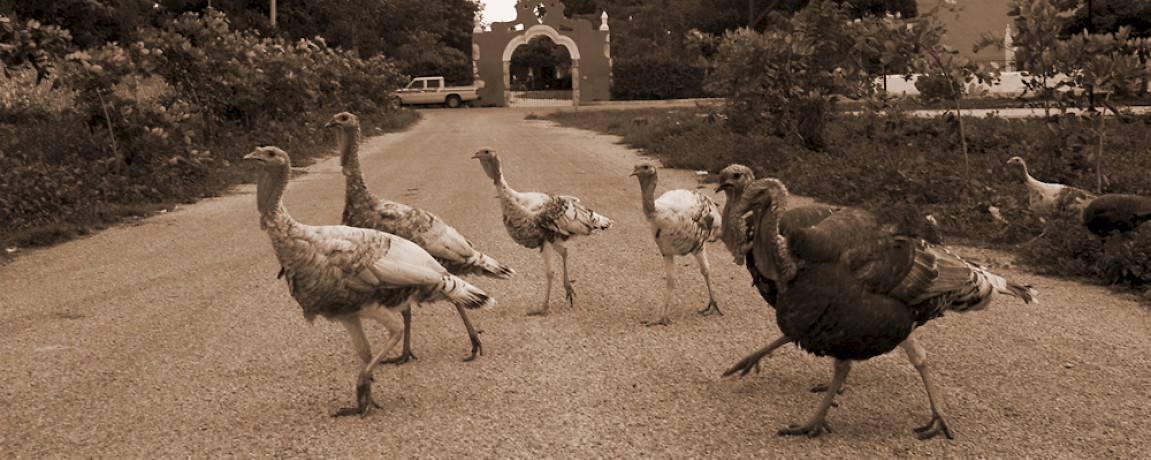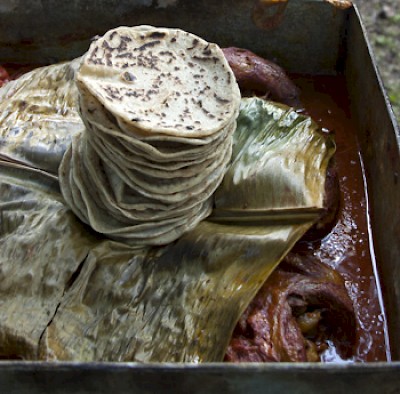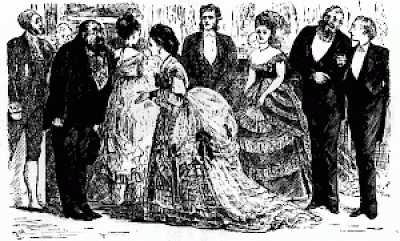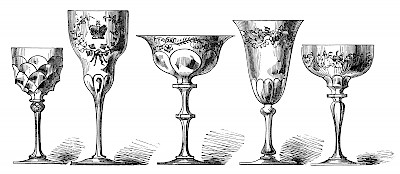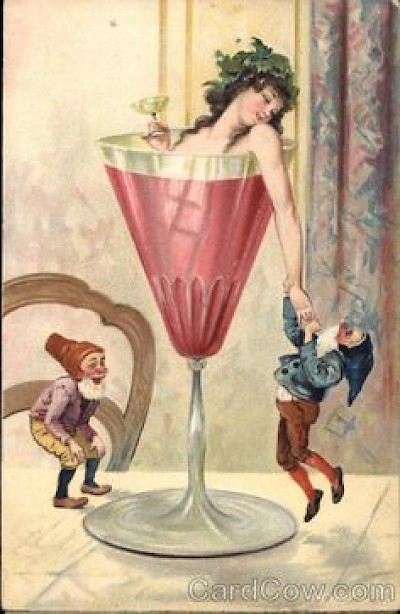One Last Effort: Chapter Seventeen
The afternoon before her saint’s day, Doña Raimunda and her domestic help were caught up in a frenzy. She had sent out a number of invitations, and it was necessary to make preparations that corresponded to the family’s social position, so she personally was working with the servants.
The pandemonium was most intense in the kitchen and the second patio. There, a woman had grabbed a dead turkey by the legs, its head bloody, and was shoving it into a caldron of boiling water so that the feathers would be easier to remove. And she was battling with Felipito, who was doing his best to snatch the biggest feathers from the victim’s tail, putting the servant woman in danger of burning herself, for with her free hand, she was protecting her face from the water’s hot steam. Elsewhere, the señora, with her bulk stuffed into a butaque, sweaty and with her sleeves rolled up almost to her shoulders, was chopping mint and chiles verdes which she placed in a pot of blood, blood with which had escaped the life of a fat suckling pig who, with its stiff legs and blanched body, was receiving the last of the scrubbings given by a strapping Indian youth, near whom was the sharpened knife he would soon use to gut the animal.
Whether or not they had the capers and olives, if they had gone to pick up the special bread or if the crates of beer and wine were already in the house were questions that, with others like them, could be heard amidst the comings and goings of the maids in their different errands to the kitchen or to the other rooms. The continuous alerts to this one or the other one to get busy or pay more attention to what she was doing competed with the señora’s shouts calling to order the lively Felipito, who was rummaging around everywhere and stealing pinches of the egg yolks ready for the relleno.
Finally the pit for burying the pig and converting it into an appetizing delicacy was hot. The coals of the burnt firewood were spread out with a stick, and on the stones that gave off sparks from the fire was the bed of banana leaves on which the animal would spend the night, marinated up to its eyes and open at the abdomen, still boasting in its interior the kidneys, liver, and plump blood sausage, no less smeared in spices than the body in which they had functioned when kindly covered by the intestinal membrane. After that, another layer of leaves and then the merciful earth which before the sun appeared would have to be removed again to disturb the final repose of the pigpen’s pampered guest, who fortunately was insensitive to suffering the voracity with which the invited guests would surely set upon the tender and succulent meat, giving a tragic climax to the brief history of its life.
It would have been around ten in the morning when friends began to arrive. Guadalupe, who was among the first, was seated in a rocking chair alongside doña Raimunda. The latter, wearing a new dress, was being showered with cards and gifts and receiving the congratulations of those who entered. Don Hermenegildo excused himself for not having arrived earlier as he had been detained on the street greeting his distinguished friend señor don Ricardo Villaverde, who had just returned from his trip to Paris. He repeated to the señora the pompous congratulatory messages that he had rehearsed and seated himself with a beatific air to await the beer that they ordered for him.
The Ortegas were also there, Isabel and Josefa, with their mamá and their brother Perico, and Chonita and some other young people, neighbors or relatives, not to mention three lawyers and two law students, invited by señor don Felipe when he was at the courthouse.
The glasses of brandy, vermouth, and beer, according to individual tastes, circulated constantly, arousing enthusiasm and talkativeness, and to complement that, the orchestra appeared to the applause of the young people who saw its arrival as an invitation to dance.
The first piece began and no one dared to get up and look for a partner, although everyone secretly wanted to. The music ended with their doing nothing other than having another drink, which persuaded the boldest to approach don Felipe and say:
“Don’t you think something’s missing from this music?”
“What’s missing?” asked the licenciado.
“Well, the dancing.”
“Yes, they should dance; I agree with you. Come on, Belita, Marucha, dance. But if you don’t go looking for them,” he added addressing the men, “they aren’t going to start. Play, maestro.”
And the orchestra began again. Lupita stepped out when invited by one of the lawyers and don Hermenegildo followed her with his eyes, envying her companion.
“And you, why aren’t you dancing?”, the guest of honor asked the bachelor.
“I, señora, I’m no good at these things. Believe me, I know what I’m talking about.”
“Well, today everyone is good at it and everyone is going to dance, including me. So get ready because there is no excuse. And dance with Lupita,” she added leaning toward him and lowering her voice.
“And take advantage of the occasion to talk to her. Ay, don Hermenegildo, if you don’t say something to her today, don’t even come back to this house, because we will no longer be friends. Now you know what’s at stake.”
“Don’t think that, doña Munda, don’t. I’m already feeling encouraged and I think the day has come.”
And while he did indeed say he was feeling encouraged, the courage was not his own but that lent him by the drinks he had consumed. Still he didn’t decide to dance the following piece, and when it ended, the table was ready.
To the table! was the phrase that was then heard and that various voices repeated. To the table, where the golden and aromatic piglet was already in place, the substantial turkey emitting its inviting fragrance, the steaming soup and other dishes, on which most of the gazes were fixed with interest, arousing the greed of their appetites.
People seated themselves where they could, and the serving of the soup began, the attentive don Hermenegildo distinguishing himself by his courtesy. A little later the bottles of wine began to be poured into the glasses.
Words were exchanged, laughter rang out, and enthusiasm grew as the meal progressed.
“Chonita, you haven’t touched that serving that they brought you.”
“Did you see the mouth that señor Méndez opens with every bite?”
“Do you want a piece of the pork skin? It’s crisp and very good.”
“That glass, don Hermenegildo; you’ve hardly touched it.”
“The feast’s saint isn’t drinking anything. Don’t set a bad example.”
“Doña Asunción is going to leave the table sick today. It’ll be a long time before the poor thing is seen in front of a turkey again.”
And the conversation continued and the warmth of the liquor increased.
“You haven’t had any wine, Isabelita,” said the master of the house as he approached her. He picked up the glass she had in front of her, and “Come on! to Raimunda’s health. Surely you won’t say no.”
The young woman drank part of the glass.
“So little?”
“But I drank some earlier.”
“A little more. Now,” he continued softly, “do me the favor of standing up and enlivening this group by getting them to drink, don Hermenegildo above all.”
“That I’ll happily do.” And armed with the glass and a bottle, she went directly to the bachelor.
“Don Hermenegildo, a glass of wine.”
“Señorita, you are very kind; but you’ll permit me to drink no more than a small amount because I’ve already had enough. Believe me, I know what I’m talking about.”
“Half to doña Raimunda’s health and the rest to mine.”
Seeing himself condemned without forgiveness, he stood up carefully and raised the glass to his lips.
Speech!, called out almost if not everyone.
The clerk was a man of forethought, and at home he had written a toast which he then learned by heart. However, he was shaking with fear that the words wouldn’t come out right, even more so having Lupita’s brilliant eyes in front of him.
“On this joyful occasion of raising my glass . . .”
“Make it rhyme!” shouted the master of the house.
“He is rhyming it!” one of the students observed ironically.
“No, señores, in rhyme, I cannot . . .”
“But you’ve written rhymes. Improvise.”
“I was a child when I wrote them. I no longer know how to.”
“Improvise! improvise!,” doña Asunción repeated with her mouth full.
“Fine, now let me speak as I can; later, we’ll see.”
“Let him speak!”
“On this joyful occasion of raising my glass to finish off the wine that’s in it, my heart is filled with emotion upon seeing the happiness of a friend who honors me with her friendship and who is blessed with such beautiful qualities.””
“Bravo-o-o!”
“Let doña Asunción speak!”
“But don Hermenegildo hasn’t finished.”
“Then continue.”
“Therefore,” the speaker continued nervously, “seeing that you come from all over to congratulate this exemplary wife and mother and are well aware of her virtues, I simply wish that not the slightest cloud dampens the heavens of her happiness.”
Don Hermenegildo sat down blushing at the “bravos” that rang out in the dining room along with the noise of the spoons and plates dancing across the shaking table.
“He learned that part about the slightest cloud in the heavens of her happiness in some gossip column,” observed the same student to the other.
More toasts followed and meanwhile, don Hermenegildo wracked his brain preparing the promised rhyming verse. Suddenly, he ran into a snag. He thought it would be very appropriate and nice to end it with his name, and the way to do that had already occurred to him, saying for example:
“ . . . wishing every happiness,
to you, Hermenegildo López”
but in order to come up with what was missing prior to that, he needed a word that rhymed with López and this wasn’t coming to him. Golpes wasn’t consonant, nor did he want to wish that the señora would be spared a “strike” or a “blow”. Soples wouldn’t work either; dobles even less; galopes, this one, yes! This word was certainly consonant with López, aside from the difference in the final letters. Galopes. Very well, as long as he could make it work. But what in the devil did the word galopes, which could only apply to horses, have to do with doña Raimunda, especially on her saint’s day?
Fortunately for him, the young people were more eager to dance than to listen to verses. They all got up and a student offered his arm to Lupita.
Doña Raimunda, wanting to play a trick on don Hermenegildo, called Isabelita Ortega over and charged her with inviting him to dance. The wine had caused the bachelor’s blood to stir and he felt like his head was walking on air. This time his caution was abandoning him and he was witty and making jokes.
He didn’t offer any objection whatsoever, and in a good mood began to remember his best times. There he was, as ceremonious as ever, bowing to the ladies to include them in the dance.
Now he was wound up. He didn’t need any added stimulus because at the next piece he resolutely steered himself toward Lupita. She was amazed to see him so changed by the wine and even more, while they were dancing, to hear him talking incessantly and flirting with her, free of all shyness.
His intoxication hadn’t reached the point of making him a nuisance, and it certainly drew him out of his customary gravity and restraint, making him talkative to the point of seeming rejuvenated, even more so with the artificial color that was creeping into his cheeks with the wine.
“I need an answer from you right now, Lupita. If you tell me no, it’s over. Death. So, what is it? Have you made up your mind to kill me?”
“But I need to think about it.”
“Surely you’ve had enough time. Surely you’ve known since that night doña Raimunda told you. She says she’ll be the matron of honor; that is, if you give your consent. How can you not consent? If you’re so good and so lovely.”
“Give me a week to think about it.”
“A week! I’ll die. Believe me, I know what I’m talking about. I’m desperate. How about three days, Thursday?”
“Fine, I’ll answer you on Thursday.”
Once an impression has been made, especially with the enthusiasm generated by wine, it grows easily. Don Hermenegildo, once having taken the first step, stopped at nothing. Not even his nerves, those miserable nerves, hindered him from saying to Lupita whatever occurred to him. She, who for her part, had felt the influence of what she had drunk no less than he, and upon noticing the favorable change in the clerk, was steadily finding him less ancient and more worthy of consideration. So much so that she had already decided that on Thursday, she would accept his proposal.
Don Hermenegildo felt satisfied.
When the music ended, after dancing with the young woman for the third time and still guiding her by the arm, he approached the lady of the house, who had been observing him with astonishment and delight.
“Doña Mundita, do me the favor of asking for two glasses of wine. Lupita and I are going to drink to your health.”
“No, don Hermenegildo; thank you, but I’ve already had many.”
“There’s no way out. It’s to the health of the fiesta’s saint, and what’s more, I don’t believe that you would dare to snub me.”
The glasses arrived and Lupita, taking control of the situation herself, said:
“Doña Raimunda, you drink part of it.”
“Child, I’ve taken a drink with every person who is here.”
“Come on, mi señora,” interjected don Hermenegildo. “To the health of your husband and Felipito, and for the sake of these eyes of mine.”
The two women laughed at the bachelor’s romantic outburst. Doña Raimunda sipped half the glass and Lupita drank the rest.
Don Hermenegildo downed his own without batting an eye.
It was almost nighttime when the dance ended. The moment for farewells arrived, but the guest of honor was nowhere to be seen. She found herself in her room writhing in pain from the nausea she suffered after all the happiness they had wished upon her.




